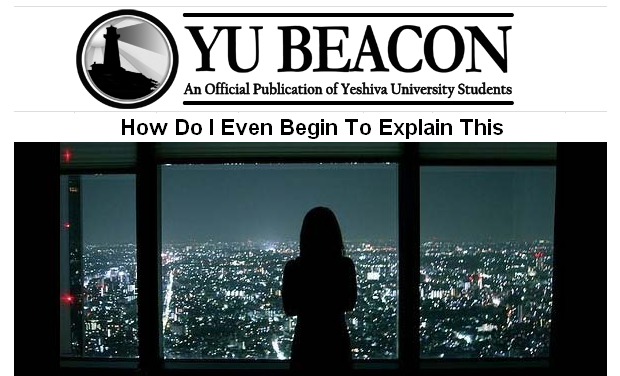The winds of scandal were blowing in full force across the Jewish world last week. An article printed in an online publication run by Yeshiva University students became the centre of controversy, and the school demanded that the article be removed. The ensuing debate was covered by Fox News and later even in some other news sources and was ultimately the subject of several parodies. After torrential internet traffic and comments, the story has slowly died down — but the ramifications of the whole sordid affair are just beginning to come to light.
Here, then, are the facts. The Beacon, apparently, is a journal put together by Yeshiva University students — a breakaway from the conservative Observer and Commenter, which allegedly have turned down an article dealing with high school Sex Ed and a pro-Palestinian editorial. The Beacon accepts articles from both male and female undergraduate in YU’s Yeshiva College and Stern College for Women undergraduate programs. Before the scandal began, The Beacon received funding from funding from the university, despite its tendency to publish more controversial material. In this case, it seems the publication went too far.
An anonymous short story written in the first person detailing a girl’s first sexual experience attracted waves of criticism and led to the temporary removal of the article, allegedly at the request of the school. Editor-in-Chief Simi Lampert refused to take down the article permanently. The result: a parting of the ways with the university, which had been providing a modest stipend to keep it running.
Ho-hum. The story itself is hardly controversial, by most standards — “Between the fumbling, the pain, the pleasure, I convince myself that I’ve learned how to make love”. And so on. This is something being published on the Internet, right? Just to make sure (as Herman Cain might ask), “Are we talking about this internet?” But it would be a mistake to underestimate the ramifications of this affair for America’s only Orthodox college, and for Modern Orthodoxy in general.
Yeshiva University was founded in 1886, offering a slightly incongruous mixture of the traditional Lithuanian Rabbinical pedagogy and higher secular education. The driving principle behind the institution became Torah U’Madda (Torah and Knowledge), as laid out by the influential Modern Orthodox thinker Rabbi Joseph B. Soloveitchik. But as the university’s influence and attendance have swelled, the delicate balance between its two core values has begun to swing, leaving a rift within the community. While some seek to modernize and question conventions in Orthodoxy — issues such as women’s minyanim, homosexuality, and non-traditional Biblical studies — the rabbinic leadership of the university endeavors to preserve the narrower, traditionally halakhic status quo.
In recent years, this conflict has increased in its scope. A symposium entitled “Being Gay in the Modern Orthodox World” was criticized by the University’s top brass as “contrary to the Torah.” Rabbi Avi Weiss, a YU graduate and dean of Yeshivat Chovevei Torah, recently attempted to give rabbinical ordination to a female student — an unprecedented move that elicited much ire from Orthodox establishment.
The exposure of a plan to filter the wireless internet provided in the YU dormitories (confirmed this week) raised alarm bells among civilly liberal-minded students. The line between free speech and halakha has yet to be clearly drawn at the university.
[youtube=http://www.youtube.com/watch?feature=player_embedded&v=knGKkfr-mdg]
The amount of fuss raised over these recent issues may appear strange to many of those looking from the outside into the Modern Orthodox world. Modernity always sparks controversy when introduced to an environment in which it had not previously been embraced. But YU is a strange beast — at once worldly and ethereal, highly conservative yet surprisingly open. The reality of college-age students ‘hooking up’ seems to have surprised no-one; the controversy has been over its open expression. As YU attempts to find a position consistent with both its secular and religious sensibilities, it must avoid alienating either of its constituencies.
Ultimately, resistance to change is a critical component of what makes up and preserves the halakha. Orthodoxy, even of the Modern persuasion, must “[conform] to established doctrine.” Tradition is its lifeblood.
It is this synthesis of openness to secular knowledge and loyalty to a staunchly traditional interpretation of Judaism which gives YU its unique place in American Jewish life. In spite of itself, it continues to draw a student body from diverse religious backgrounds, while striving to maintain its 100% “kosher” image. As such, the institution serves as a barometer for American Orthodoxy in general — torn between the indispensability of secular Western values and its own religious identity. The growing polarization should be of concern to anyone to whom the future of the Jewish people is important. If the dichotomy between the authentic religious experience and the values of liberty and tolerance cannot provide a healthy environment for the contemporary Jewish student — if one side of the scale begins to outweigh the other — then we will see the negative results that the Modern Orthodox experiment always threatened to yield.
Related articles
- Jewish University Cuts Off Paper Over Sex Column (foxnews.com)
- Pre-Marital Sex Story Shakes Up YU (lukeford.net)
- Yeshiva University Strips Newspaper Of Funding For Standing Up For Journalistic Principle and Refusing To Retract Study Article (jonathanturley.org)
- Sex Essay Sparks Uproar at Yeshiva U. (myfoxny.com)


There is a big difference between dealing with and validating the issues. Fundamentalism breeds when people can not express their struggles, it is not the cause of such a reality.
Freidi, you must of had one awesome roommate. Or else you’re the cool one and he must now be cool by association.
My point exactly, Lapin.
And I’m definitely the cool one. No hard feelings…